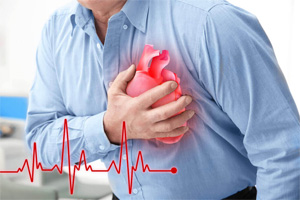- Home
- Editorial
- News
- Practice Guidelines
- Anesthesiology Guidelines
- Cancer Guidelines
- Cardiac Sciences Guidelines
- Critical Care Guidelines
- Dentistry Guidelines
- Dermatology Guidelines
- Diabetes and Endo Guidelines
- Diagnostics Guidelines
- ENT Guidelines
- Featured Practice Guidelines
- Gastroenterology Guidelines
- Geriatrics Guidelines
- Medicine Guidelines
- Nephrology Guidelines
- Neurosciences Guidelines
- Obs and Gynae Guidelines
- Ophthalmology Guidelines
- Orthopaedics Guidelines
- Paediatrics Guidelines
- Psychiatry Guidelines
- Pulmonology Guidelines
- Radiology Guidelines
- Surgery Guidelines
- Urology Guidelines
Unrecognized heart attack in diabetes patients increases risk of death

USA: Diabetes has been understood as a multi-organ and a multi-specialty disease. It affects various organs including eyes, nerves, kidney, vessels, brain, and heart together. A recent study in the journal Diabetes Care has found that in asymptomatic patients with diabetes having no history of cardiac disease, there is an increased prevalence of unrecognized myocardial infarction (MI) that confers a markedly increased risk of clinical heart attack and death.
Michael D. Elliott, Duke Cardiovascular Magnetic Resonance Center and Division of Cardiology, Duke University Medical Center, Durham, NC, and colleagues conducted the study to determine the prevalence and prognostic significance of MI by delayed-enhancement MRI (DE-MRI) in asymptomatic patients with diabetes.
The study sample consisted of 120 asymptomatic patients without known cardiac disease. Two pre-specified cohorts underwent a research MRI: 1) a high-risk group with type 1 diabetes and chronic renal insufficiency (n = 50) and 2) an average-risk group with type 2 diabetes (n = 70). A composite of all-cause mortality and clinical MI was the primary endpoint.
Also Read: High BP,Diabetes more strongly linked to heart attack in women: BMJ
Key findings of the study:
- Overall, the prevalence of unrecognized MI was 19% by DE-MRI (28% high-risk group and 13% average-risk group) and 5% by electrocardiography.
- During up to 5 years of follow-up with a total of 460 patient-years of follow-up, the rate of death/MI was markedly higher in patients with diabetes with (vs. without) unrecognized MI (all 44% vs. 7%, high-risk group 43% vs. 6%, and average-risk group 44% vs. 8%).
- After adjustment for Framingham risk score, left ventricular ejection fraction, and diabetes type, the presence of unrecognized MI by DE-MRI conferred an eightfold increase in the risk of death/MI.
- Addition of unrecognized MI to clinical indices significantly improved model discrimination for adverse events.
Also Read: Metformin reduces risk of heart attack in Prediabetes with stable angina, finds study
"According to findings, unrecognized MI is prevalent in asymptomatic diabetes patients without a history of heart disease, resulting in a significantly increased risk of death and clinical MI," concluded the authors.
For detailed study log on to https://doi.org/10.2337/dc18-2266

Disclaimer: This site is primarily intended for healthcare professionals. Any content/information on this website does not replace the advice of medical and/or health professionals and should not be construed as medical/diagnostic advice/endorsement or prescription. Use of this site is subject to our terms of use, privacy policy, advertisement policy. © 2020 Minerva Medical Treatment Pvt Ltd